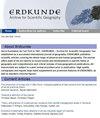非正式作为危机管理?-德国莱茵兰-普法尔茨州2019冠状病毒病大流行期间城市间合作的工作关系
IF 1.1
4区 社会学
Q3 GEOGRAPHY
引用次数: 0
摘要
规划和网络在很大程度上不仅由现有法规决定,还由人际关系决定。专业环境中的正式工作关系尤其受益于非正式沟通,这反过来又赋予了这些工作关系个人方面的内容。新冠肺炎大流行及其产生的控制措施也对工作关系构成挑战,包括规划环境中的工作关系。德国的一个规划项目证明了这一点,该项目构成了本文的基础。定性研究用于调查疫情对项目工作的影响以及项目参与者如何应对疫情。通过对一段时间以来的合作进行比较和回顾性观察,可以确定参与者继续项目工作的策略。该分析基于25次定性利益相关者访谈。结果显示,疫情对该项目的网络产生了不同的影响。非正式沟通的战略性使用大大有助于项目工作的继续,尽管这种沟通的使用方式不同。此外,长期以来,项目利益相关者既没有意识到正式沟通和非正式沟通之间的区别,也没有意识到非正式沟通的相关性。分析这种理解是本文的一个中心方面。总之,加强正式规划项目中的非正式性有助于它们的成功。本文章由计算机程序翻译,如有差异,请以英文原文为准。
Informality as crisis management? – Work relationships in inter-municipal cooperation during the COVID-19 pandemic in Rhineland-Palatinate, Germany
Planning and networking are largely determined not only by existing regulations, but also by human relationships. Formal work relationships in professional contexts benefit in particular from informal communication, which in turn gives these work relationships a personal aspect. The COVID-19 pandemic and the resulting control measures were also challenging for work relationships, including those in planning contexts. A planning project in Germany, which forms the basis for this article, demonstrates this. Qualitative research was used to investigate the impact of the pandemic on project work and how the project participants dealt with the pandemic. Through comparative and retrospective observations of the cooperation over time, it was possible to identify participants’ strategies to continue work on the project. This analysis is based on 25 qualitative stakeholder interviews. The results show that the pandemic had varying impacts on the project’s networks. The strategic use of informal communication contributed significantly to the continuation of the project’s work, although this communication was used in different ways. In addition, for a long time, the project stakeholders were neither aware of the differentiation between formal and informal communication, nor of the relevance of informal communication. Analysing this understanding represents a central aspect of this article. In sum, strengthening informality in formal planning projects contributes to their success.
求助全文
通过发布文献求助,成功后即可免费获取论文全文。
去求助
来源期刊

Erdkunde
地学-自然地理
CiteScore
2.00
自引率
7.10%
发文量
17
审稿时长
>12 weeks
期刊介绍:
Since foundation by Carl Troll in 1947, ''ERDKUNDE – Archive for Scientific Geography'' has established as a successful international journal of geography. ERDKUNDE publishes scientific articles covering the whole range of physical and human geography. The journal offers state of the art reports on recent trends and developments in specific fields of geography and comprehensive and critical reviews of new geographical publications. All manuscripts are subject to a peer-review procedure prior to publication. High quality cartography and regular large sized supplements are prominent features of ERDKUNDE, as well as standard coloured figures.
 求助内容:
求助内容: 应助结果提醒方式:
应助结果提醒方式:


